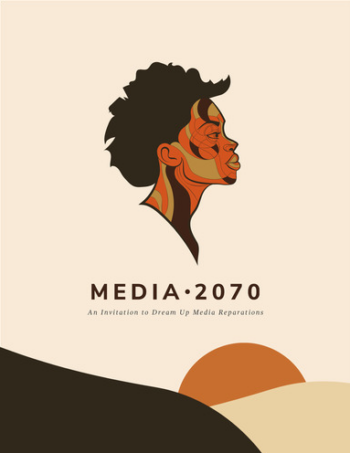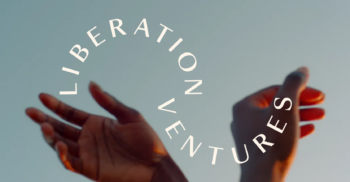Janine Jackson interviewed Media 2070’s Joseph Torres and Collette Watson about media reparations for the May 3, 2024, episode of CounterSpin. This is a lightly edited transcript.
Janine Jackson: The idea of some form of public, communal recognition and redress, or reparation, for Black Americans for centuries of systemic, state-sanctioned harms, and their lasting and continuing impact, is not new. But our guests’ work considers the particular meaningful and sustained harms of news media, of journalistic institutions charged with informing the public without fear or favor, that historically and currently have used their special place and power to help drive the oppression of Black and brown people—through storytelling, and through overt support for racist practices, policies and ideas.
Media 2070 was co-founded by Joseph Torres, who is senior advisor for reparative policy and programs at the group Free Press—and co-author, with Juan Gonzalez, of the crucial book News for All the People: The Epic Story of Race and the American Media—and writer, musician and communication strategist Collette Watson, who is co-founder of the new group Black River Life. Their co-authored article, “Repairing Journalism’s History of Anti-Black Harm,” appears in the Annals of the American Academy of Political and Social Science.
And they both join us now by phone from Washington, DC, and Phoenix, Arizona, respectively. Welcome back to CounterSpin, Joe Torres and Collette Watson.
All right, well, “crisis of journalism” is going to be a phrase that a lot of listeners are familiar with. It’s a conversation among people, and among philanthropists, about how we can “save journalism.” But it’s unclear to us at FAIR, as to many others, if some of those folks in that conversation really understand that corporate journalism, US mainstream, so-called, journalism, has always contained its own poison. And if they are actually willing to address that, or if the goal is more of the same elite conversations that have excluded lots of people, but to do them in a more genteel way than maybe Fox News.
So I want to ask you both, to start: What is missing from current diagnoses and remedies for what we’re told is the crisis of journalism?
Collette Watson: I guess I’ll kick us off, and just say that what’s missing is an acknowledgement of our media system’s history of harm. And when we talk about that—Joe and I are both co-creators of the Media 2070 project—when Media 2070 talks about this, we often say that, similar to our education system and our legal system, which so many people understand as oppressive, our media system is rooted in anti-Blackness, and in racism and racial hierarchy, since the very beginning.
When you look at the earliest colonial newspapers, which stayed afloat on the revenues that they were gaining from serving as brokers in the trafficking of enslaved African people, by not only posting ads, paid ads, for people who had emancipated themselves and run away, but also in the sales of enslaved folks and serving as a broker for those transactions.
We know that from that earliest route, right on through till now, our system of news, information, journalism—even entertainment media, book publishing—all of those are interconnected, and have been rooted in upholding a myth of Black inferiority, and have actually perpetuated white supremacy and even white nationalism. So you have to have that in mind, whenever you are thinking about journalism and the role it has played in society, and the role that we want it to play in the safe, just, multiracial democracy we want in the future. We can’t achieve that without acknowledging the history of harm.
Joseph Torres: I’ll add, Collette and I, we began writing this essay over a year ago for this political journal, and Collette, one of the co-creators of 2070, but also the senior director of the 2070 project until recent weeks, and what we try to do in this essay is: There is this big debate happening right now about the future of journalism, and how it goes, is mostly a white-led space. And the way the discussion has taken place is, the democracy is in crisis and so is journalism, and we need to save local journalism to save democracy. But as Collette is describing, what that does not acknowledge is the role of local news organizations and in local journalism in undermining democracy for Black people and people of color.
At the Media 2070 project, we’re asking the question: when hasn’t journalism been in crisis for Black people, and when hasn’t democracy? And these media institutions have played a direct role in undermining democracy.
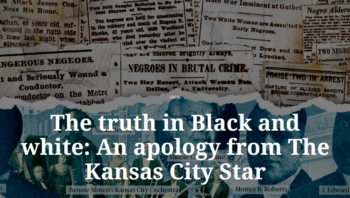
Kansas City Star (12/22/20)
And in recent years, we have the Los Angeles Times apologizing for it being the paper of white supremacy for at least its first 80-plus years. We have the Oregonian saying that it was a paper, when it began, to try to ensure that Oregon remained a white state. The Baltimore Sun apologizing for its role in upholding the housing segregation in its editorials in the newspaper in support of it in Baltimore; and the Kansas City Star did much the same. The Philadelphia Inquirer apologized.
These are all just within recent years, and within the future of journalism debate, there isn’t even acknowledgement that this actually happened, that these papers have actually apologized.
What are we creating that’s different? How do we address issues of racial hierarchies, and that these institutions have played a role in undermining democracy for Black folks, and for other folks of color? So if we think the current democracy can be equated with the right to vote and equal-protection rights being reinstated 60 years ago, local journalism by dominant news organizations have played a role in undermining democracy, so-called democracy, for Black folks and other folks of color since the get-go, and still are today.
And so we are just trying to make an intervention into this debate, because the debate is happening; there’s a lot of money being invested in the space. There’s a lot of policy work happening—not just with the federal government, in local states—trying to make an intervention in funding local journalism. And we are afraid we’re just going to be replicating the same kind of harms.
JJ: Yeah, saving democracy via local journalism seems to mean, for a lot of folks, just shore up and sustain these local journalistic outlets. There’s the missing piece of acknowledgement of the harms that those outlets have done, and it’s clear that some people view the whole idea of reparations more broadly as “something bad happened to people in the past,” and so people that “look like them,” to put it crudely, are looking for resources now.
But I feel that, particularly if you look internationally, and even within this country, that understanding is shifting, so that people see, not just that harms on individuals, but on communities, are unending, but also that they see that truth and reconciliation processes, that they’ve seen in South Africa or in Argentina or in El Salvador, for example, they involve healing for the whole community.
And the starting place is not only about debts unpaid, but it’s about acknowledging that there’s been a distorted understanding of history, that everyone has been harmed –, particularly the people who have been specifically oppressed and harmed, but reparation involves acknowledgement first. It’s not a question of throwing money at the issue. There is an acknowledgement, and a truth-telling, that has to happen first.
That’s my rambling, you can call that a question, but you know what I’m saying, that it’s not enough to say, “Oh, we did a bad thing,” as some papers are doing. “Back in the 18-dickity-do, we wrote a bad thing, but we’re sorry about it.” That’s not what is being called for.
CW: Absolutely. And I think one key part of this is really seeking to broaden, not only our sense of journalism and its history and its future, but our sense of what repair and reparations involve.
When we created the Media Reparations Project, we also sought to really spread the understanding that reparations has to be a holistic process. We took a lot of inspiration and leadership from people who have been fighting for reparations ever since emancipation. And when we are speaking to what reparations is all about, often in community, people sort of reduce it to this idea of a check.
As you just said, Janine, it’s not just this one-time apology, or even a one-time payment. It has to be holistic and understood as a process, a journey rather than a destination. And speaking of folks we took inspiration from, our friends at Liberation Ventures, which is a reparations organization, they describe reparations as a comprehensive process that involves reckoning, acknowledgement, accountability and redress.
And when you’re talking about the realm of journalism, Joe mentioned a couple of different platforms and papers that have issued apologies and sort of stopped there. And we know that this entire conversation around the future of journalism is one that should really inform what next. After the apology, and after the investigation, what is it that newspapers and other media platforms can and should be doing to rectify the different types of harm that they have wrought—whether that be sensationalistic headlines and false headlines that led to racial terrorism and lynching, whether that be the ways that, even to this very day, it’s nearly impossible for journalists to sustain careers because of toxicity in newsrooms. And there’s so much more that we could name, but it has to be an ongoing process that’s engaged with people who have been directly impacted, and defined by community.
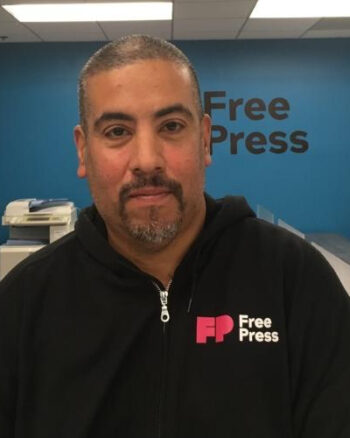
Joe Torres: “For us to be able to tell our own stories, to own our own institutions, in order to fight for racial justice, for reparations, the system is going to have to change too.”
JT: When we’re talking about these papers, we talk about narratives, right? And narratives are a political tool. Narratives are used by those in power, and these media companies, to uphold racial hierarchy. And “uphold racial hierarchy” means not just within those newsrooms, but within the society as well. So these newsrooms are playing an outsized role in shaping what local communities look like. And we talked about the example of segregation in Baltimore, and wealth creation and wealth death and all that.
And so these media companies are playing a role in reinforcing the racial hierarchies throughout each community they serve, whether schooling, housing, just name it, right? They’re playing a role in shaping the society with their narratives. Because these powerful media owners are political players within the society in which they exist.
And so the idea of acknowledgement, it’s just the beginning, as Colette is saying, and you’re talking about, too, Janine; it has to be like, how do we get to redress?
Because what’s happening, they reinforce structural racism in our society in all these various ways.. And for us, we’re just focused on the media part, because structural racism also exists in the media system. So for us to be able to tell our own stories, to own our own institutions, in order to fight for racial justice, for reparations, the system is going to have to change too, for our own communities to be able to own and control the creation and the distribution of their own narratives.
And so this is what we’re fighting for. If we can shift how media functions, I think there’s a better chance, or a greater chance, that we could actually address all the other underlying causes that are affecting society, that newsrooms play a role in promulgating in all these different ways.
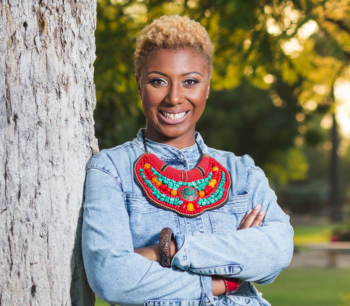
Colette Watson: “There’s a deep distrust of journalism across communities of color, because there is a deep history of harm.”
CW: Joe, I think in addition to changing the way that the media has perpetuated hierarchy and harm in society, this discussion around repair, and really reframing the way we understand the future of journalism conversation, is also an invitation to actually save journalism. And I think that there’s a lack of understanding of the fact that journalism being white-dominated, and being steeped in a worldview of Black inferiority and a worldview of racial hierarchy, has very much been a part of why we find this industry to be faltering at this point.
It’s policies and culture and so much, but it’s all grounded and rooted in journalism’s early rootedness in racism. And what I mean when I say that is, we talk a lot and we hear a lot about community trust and community engagement and different things about how audiences perceive the field, and how they’re willing to even maybe invest in it, whether that be investing time or what have you. But there’s a deep distrust of journalism across communities of color, because there is a deep history of harm.
And then there are so many journalists of color who have tried to be truth tellers, and tried to embody the true purpose of journalism in holding power to account, who have found it next to impossible to do that, because of toxicity inside dominant and corporate newsrooms, and because of the underfunding and underinvestment in Black-serving and other-serving, different religious minorities and other groups, LGBTQIA+ community—all of the newsrooms that serve these marginalized identities have been woefully under-resourced by the public sector and by philanthropy, when compared to their white counterparts.
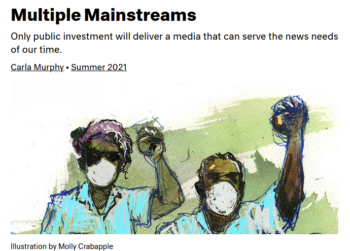
Dissent (Summer/21)
And so, whether it be on the part of journalists of color or communities of color, there’s this deep divide, and this sense that the main, dominant media doesn’t care about our lives, and doesn’t think of us when they’re talking about journalism and democracy. And when I talk about that to people, I like to always say, there’s two words you can add on, in the ways you’re talking about these issues of the future of journalism, that’ll take you so much further than where we usually go. And those two simple words are “for who.” Journalism for who? Democracy for who? Who are we serving?
Carla Murphy talks about “multiple mainstreams,” and thinking of the future of our media system as one that is steeped in serving the information needs of just so many different kinds of folks, and serving the creation of conditions for different kinds of justice. And I think that when you begin to think about who we are wanting to serve and whose needs we’re centering, that opens up so much more opportunity and so much more oxygen around what journalism can be. But we can’t get there if we just talk about it the same old way and really are using legislation and policy ideas and philanthropy to shore up the status quo.
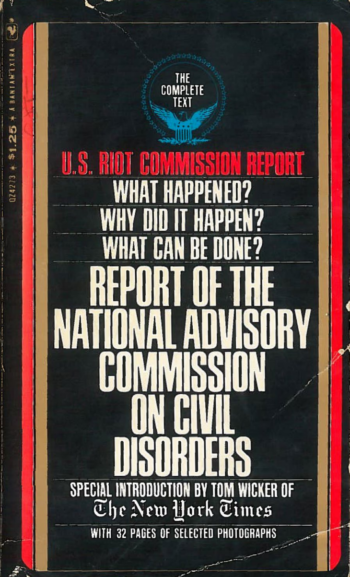
Kerner Commission (1968)
JJ: Absolutely. I just want to say that, for some folks, this might sound out of pocket; it might sound like a new idea. But the truth is, this is drawing on roots. The Kerner Commission, just to say one thing folks remember, but they remember it as saying, media should do better by Black people. And that’s not what it said. It said news media are failing everybody and failing the future with their white-centric perspective. It challenged the whole thing. So there are historical roots that you’re pulling on here. There are traditions here, there are examples here. It’s not out of whole cloth. There is something to connect to here that gives strength to the ideas that we’re putting forward here.
CW: Yes. I mean, Joe Torres, for my money, is one of the most incredible researchers and minds that we have in this field, and I really encourage folks to dig into the essay, because throughout these pages, as you’re describing, Janine, there are just so many examples from throughout history.
A lot of people don’t realize, for instance, that the earliest FCC broadcasting licenses were issued during the Jim Crow era, and so to white men only. And so that leads us to the present day, where we have a media system where just a very scant percentage of our TV and radio are Black-owned.
And we could go on and on, because, like I said, Joe has just done exhaustive effort here in making sure that we have the evidence when we talk about this. Joe, I know you don’t like getting credit, but….
JJ: But, hey, when you have to, you have to, because voids need to be filled, frankly. It’s not a conversation that folks have. Folks have it rhetorically: “I bet there’s things missing here,” but they don’t know what’s missing, and that’s—they need work like you’re doing.
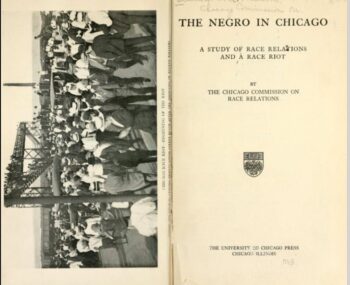
The Chicago Commission on Race Relations (1922)
JT: I appreciate that. Collette knows I don’t like that, but I appreciate it. One of the things we learned in putting this essay together four years ago, was that in Chicago, there was a commission formed to study the causes of the upheaval, the Chicago race riots. And it came out in a report in 1922, and it devoted a significant portion of the report to the media’s role, the white media’s role, in fomenting this. And so here was an example of a multiracial commission that said, “Hey, the media, especially the white media, played a role in this racial, so-called, unrest, the violence that happened in this city.”
Then you talk about the Kerner Commission, Janine, and then 50 years later after that, what we have in 2020, the uprisings, and all these folks within journalism circles calling on their newspapers or their media institutions to address racism in their own newsrooms.
And one of the things that’s really understudied, it’s a really unbelievable example to me: In 1964, the Community Relations Service was created. It became, soon after that, an agency within the Department of Justice. And the peacekeepers, the mediators, they realized early on, within the first few years of its founding, that a major obstacle to integrating our society, to people adhering to Brown v. Board, was journalism, was the media, and that they had to try to not just integrate the media systems, but they started to hold conferences for Black and brown folks, and for people to fight license challenges against broadcast, and they brought in experts who came in and taught activists how to challenge broadcast licenses. This is within the Department of Justice, and that part of its mission was basically not funded anymore, following the Nixon administration, right?
Here’s a government agency within the Department of Justice, realizing that the biggest obstacle to people adhering to the decision of Brown v. Board, and integrating our society, was the media. That’s another indictment, as you’re saying, about the Kerner Commission, a little over 50-plus years ago.
And so we’re still dealing with this. We’re still dealing with that we don’t have our own institutions, that the first chairman of the FCC was the former chief justice for the Mississippi Supreme Court. Of course Black and brown people wouldn’t get licenses during this era. It’s all been baked in, right? It’s all been baked in. And since then, consolidation has only put things out of reach for us, compounding the lack of wealth that exists in our community because of the extraction of our nation’s political project, right?
JJ: Absolutely. Well, I’ll just ask, finally, what do folks who think, media reparations? Is that going to restrict what I get to see and hear? Is that going to police what I get to see and hear? That’s not the conversation that we’re talking about having, right?
CW: Absolutely. I mean, Joe, I will defer to you.
JT: Well, I mean, we talk about abundance. It should be an abundance of voices out there. And there’s no reason we have such a concentrated media system, where you have a few companies; and here we talk about the cable/broadcast model, for example, which—television is still making a lot of money, and news is driving that. So while we’re talking about a so-called crisis in journalism, we talk about, normally, print media. Broadcast media is trying to get in the action too, and trying to take legislative efforts to get their piece of the pie, while they’re making a lot of money, right?
And so, it’s like, how can we have an abundance of Black and BIPOC media outlets out there that’s serving local communities, that’s providing a variety of perspectives. And we are fighting for not only the variety of perspectives, but also a tether to serve the health and well-being of the community, not out there for bottom-line profits, right, and to maximize profit. How can we have an abundance of this?
The idea is, it’s not what’s being taken away from you, it’s what’s going to be added to your life, to ensure the health and well-being of the communities. How is it serving the health and well-being of the needs of people in local communities and local society? And media can play an instrumental role in ensuring that, in advocating for that. Or it too often plays a detrimental role, as we see, in taking away those kinds of rights that allow people to have their basic needs served, in housing and food and schooling.
And so, the vision for an abundance of media outlets that are well-funded? There’s no reason why we can’t do that. We invest so little in this country into media, and especially in public media, and we can create something different, and something better.
JJ: That’s beautiful. All right, we’ve been speaking with Joe Torres from Free Press and Collette Watson at Black River Life. You can tap into the work that we’ve been talking about at MediaReparations.org. Joseph and Colette, thank you so much for joining us this week on CounterSpin.


